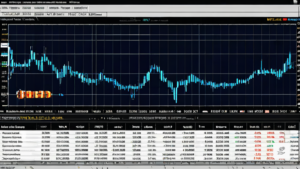Mastering the Psychology of Trading: The Key to Success

Understanding the Complexities of Trading Psychology
Trading psychology is a vital aspect of an investor’s toolkit, often overlooked amidst discussions of technical analysis and market trends. It encompasses a myriad of emotions and skills that shape a trader’s decision-making process. From quick-wittedness to discipline, each trait plays a crucial role in navigating the financial markets.
Unveiling the Core of Trading Psychology
At the heart of trading psychology lies the ability to manage the risk/reward ratio effectively. Contrary to popular belief, successful traders are not merely ‘risk takers.’ They exhibit a blend of discipline, intuition, and strategic thinking that sets them apart in the competitive world of trading.
The Significance of Trading Psychology
To thrive in the financial markets, traders must embody decisiveness and composure. Balancing risk-taking with caution, they navigate a landscape fraught with uncertainty. Emotions like fear, greed, and pride often influence trading decisions, highlighting the need for a resilient mindset.
Navigating Emotions in Trading
Fear and greed are two predominant emotions that impact a trader’s psyche. Fear can lead to premature exits from profitable trades, while greed may cloud judgment and distort the risk/reward equation. Managing these emotions is crucial for sustainable success in trading.
The Fear Factor in Trading
For many traders, fear can be paralyzing, prompting hasty decisions that undermine long-term profitability. Overcoming this emotion involves maintaining a balanced perspective on risk and reward, a skill that separates seasoned traders from novices.
Confronting the Greed Trap
Greed poses a significant threat to rational decision-making, often leading traders to overextend themselves in pursuit of higher returns. By recognizing the limits of the risk/reward ratio, traders can avoid falling prey to impulsive actions driven by greed.
Avoiding Common Trading Pitfalls
Misguided beliefs and behavioral patterns can derail even the most promising trading strategies. By identifying and rectifying these pitfalls, traders can enhance their psychological resilience and improve their overall performance.
Confirmation Bias in Trading
Confirmation bias, the tendency to seek information that aligns with preconceived notions, can distort decision-making in trading. Overcoming this bias requires a willingness to consider diverse perspectives and objectively evaluate market data.
Learning from Losses
Losses are an inevitable part of trading, serving as valuable learning opportunities rather than insurmountable setbacks. By reframing losses as stepping stones to growth, traders can cultivate a resilient mindset and adapt to evolving market conditions.
Harnessing Trading Psychology for Success
By integrating psychological principles into their trading approach, investors can optimize their decision-making process and achieve sustainable results. Cultivating self-awareness, emotional control, and adaptability are key pillars of a successful trading mindset.
Embracing Continuous Learning
The journey to mastering trading psychology is ongoing, with opportunities for growth and refinement at every turn. Staying curious, open-minded, and receptive to feedback are essential traits that distinguish successful traders from their counterparts.
Building Confidence in Your Decisions
Believing in your analysis, intuition, and research is fundamental to making informed trading decisions. Confidence in your abilities enables you to navigate market uncertainties with poise and conviction, setting the stage for long-term success.
Striving for Trading Excellence
Achieving excellence in trading requires a harmonious blend of technical expertise and psychological acumen. By honing their emotional intelligence, risk management skills, and decision-making processes, traders can elevate their performance and unlock their full potential in the financial markets.




